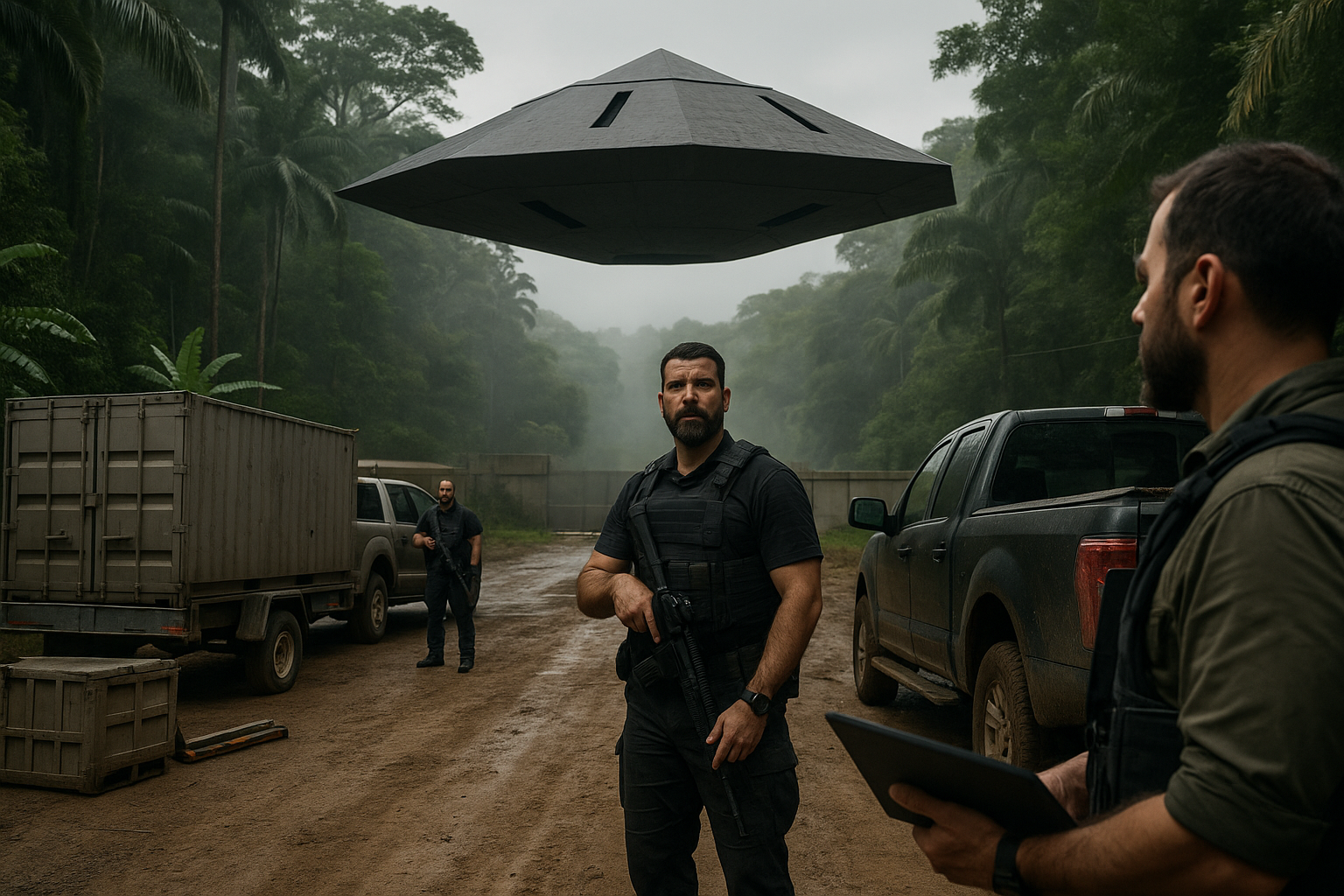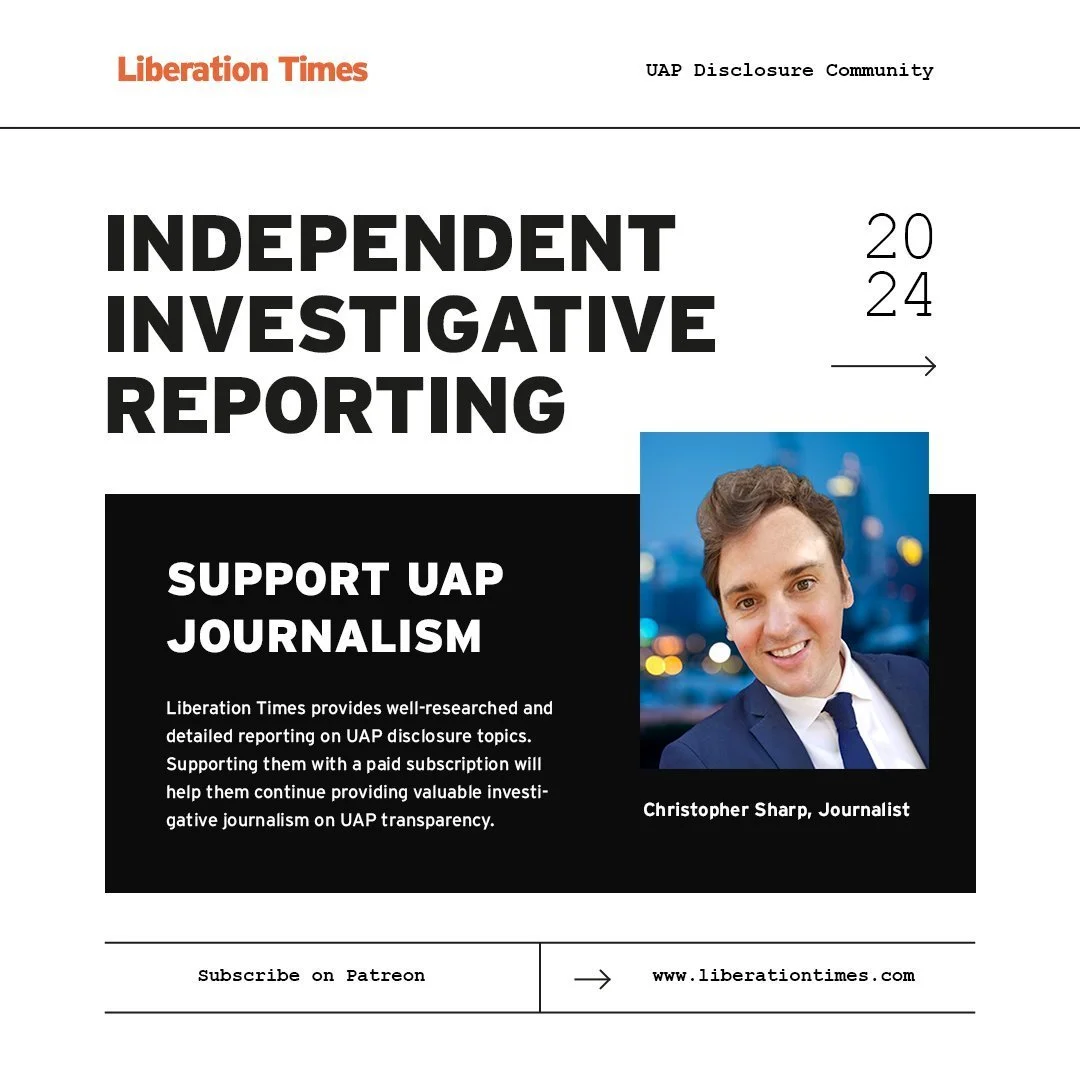The Cost of Disclosure: How Intimidation Keeps UFO Witnesses Quiet
Written by Christopher Sharp - 24 August 2025
The first thing, Mike Herrera says, is the pressure.
It arrives as a feeling before it becomes a fact: the sense that people asking the wrong questions are being watched, leaned on, or shut down.
Politicians, congressional staffers, and whistleblowers are facing threats and intimidation from Intelligence Community operatives and government contractors as they investigate covert Unidentified Anomalous Phenomena (UAP) programs, according to the Marine veteran, who says he has briefed the Pentagon’s All-domain Anomaly Resolution Office (AARO) and the Senate’s Intelligence and Armed Services Committees.
“Absolutely - it happens quite a bit,” Herrera told Liberation Times.
“Many feel the heat [investigating UAP allegations from whistleblowers and witnesses], and I personally know some, though I won’t name them. It’s a very common trend among staffers and even politicians to be threatened or intimidated in an effort to make them back off.”
The intimidation, he says, is meant to be unmistakable - more than whispers in corridors, closer to a performance of power.
“They use surveillance to make people feel uncomfortable - helicopters are the big one. They’ll fly over someone’s residence or circle them, just as a reminder: ‘You’re on our radar.’ It’s happened to me personally, and it’s happened to many whistleblowers I know. Even staffers and some politicians have experienced it, over and over again.”
From pressure tactics, Herrera moves to structural allegations: efforts inside Congress that steer inquiries away from sensitive lanes, especially around alleged crash retrievals and reverse engineering.
“There are staffers and even sitting members of Congress who are essentially CIA plants. They either work to obscure perceptions or try to put up roadblocks in front of anyone attempting to look into it.”
Asked if compromise and blackmail play a role, he doesn’t qualify his answer:
“Absolutely, I know that for a fact. I'm not going to go into detail, but I know that that happens for a fact.”
That environment, he argues, leaves many on Capitol Hill struggling to gain clarity.
“I’ve noticed that many members of Congress have no idea what’s going on,” Herrera said.
“They’re trying to get to the bottom of it, but at the same time, there are people within their own ranks putting their feet on others’ necks, trying to limit it as much as possible.”
Even so, he points to officials he trusts to take credible reports seriously.
Despite threats and conflicts of interest, Herrera does trust some members of Congress - of note, Representative Eric Burlison, who recently recruited UAP whistleblower, David Grusch, to his staff and has been leading political efforts for greater transparency:
“Congressman Burlison is definitely someone who can help. He’ll listen to their stories and look for corroboration on his end… he’s a good guy to talk to.”
Above: Representative Eric Burlison
For Herrera, the story didn’t begin in Washington.
It began amid earthquake rubble. In late September 2009, a magnitude-7.6 quake struck West Sumatra, devastating Padang and surrounding districts and triggering a large international relief effort.
Above: Mike Herrera
Herrera says that during those operations near Padang, his six-man team encountered a hovering octagonal craft and was threatened by unmarked U.S. personnel.
The experience, he says, rewired his assumptions.
“I used to think it was just Hollywood - just movies, just stories that sold well. But when that happened in 2009, it… confirmed two things: first, that we had the technology, and second, that we got it from somewhere else - which means non-human intelligence exists, because that’s where it came from.”
Herrera had suspected that this operation was illegal and involved human trafficking.
He contends that the government office tasked with clarifying the record - AARO - has, at times, distorted it.
“Everyone I know who has testified has had their statements misrepresented in the first AARO [historical record] report… They’re not supposed to steer things into a different narrative; they’re supposed to present what was said. And they simply didn’t do that.”
In Volume 1 of AARO’s Historical Record Report, released last year, the office summarised an interviewee (Herrera) from a 2009 humanitarian mission as encountering ‘U.S. Special Forces’ loading containers onto a ‘large extraterrestrial spacecraft.’
By contrast, Herrera has described the craft as manufactured - “it had rivets… it had seams” - and the personnel as unmarked U.S. paramilitary forces - potentially from the CIA, not an identified Special Forces unit.
He also says the report left out the surrounding context he’s publicly discussed, including threats and human-trafficking claims tied to that episode.
That moment, in 2009, pulled him into a network of insiders and a vocabulary that sits outside mainstream science.
Since then, Herrera has built relationships with insiders like Jake Barber, a U.S. Air Force veteran and helicopter pilot who says he contracted to fly twin-engine helicopters on sensitive retrieval missions involving potential advanced non-human craft and first came forward publicly in a NewsNation interview with Ross Coulthart.
Barber now leads Skywatcher, a research team drawn from intelligence and aerospace circles.
In August 2024, Barber’s team conducted its own operation to summon a UAP using a psionic asset - a term referring to an individual believed to possess heightened mental or psychic abilities, such as telepathy or remote influence.
The Pentagon told Liberation Times in February 2025 that AARO is aware of Barber’s claims and is investigating them.
Barber has publicly backed Herrera’s core account, saying it corroborates what he knows: paramilitary units recruit psionic assets and move them to the United States from other countries.
Barber’s public stance distinguishes recruitment from trafficking - something Herrera now agrees with.
Jake Barber disputes that what Herrera witnessed amounted to human trafficking.
He says he has verified that the operation involved recruiting and voluntarily transporting individuals with psionic abilities out of Indonesia - potentially to summon UAP of non-human origin.
That distinction sets the frame in which Herrera places his own experience. What Barber describes, Herrera says, matches a pattern he has heard repeatedly from other sources.
“The way the operations were described to me was pretty much identical to that… I don’t doubt it was psionics at all. Even the advanced vehicles and containers inside function not only as a transportation system, but also as a workstation.”
When asked whether Barber knew of the octagonal craft type, Herrera’s answer is terse: “Yes, he was.”
Above: Jake Barber
Herrera told Liberation Times he has no doubt the craft was built with the aid of reverse-engineering efforts using recovered, advanced non-human craft.
The allegations relating to psionic powers and science-fiction-type craft are difficult to swallow for many who have not been following the UAP topic.
However, Congress is taking such allegations seriously. Senator Chuck Schumer, a member of the Gang of Eight privy to the USA’s closest-held secrets, has on consecutive occasions even introduced legislation that references ‘non-human intelligence’ and ‘technologies of unknown origin.’
Herrera also sees interest in Trump’s orbit:
“I won’t reveal who I’ve spoken to for their safety… but hopefully there are people within Trump’s administration - including President Trump himself - who understand this is a problem that needs to be reined in.”
As Herrera sketches the community of whistleblowers and witnesses, he divides the risks into two overlapping worlds. One is kinetic and immediate - the realm of security and retrieval - populated, he says, by highly trained tier one operators.
“They work as contractors, either for the [CIA] or for aerospace [contractors], which are kind of integrated. It’s good pay… Most of them are tier one operators from the United States Special Operations community.”
The other world is technical and cloistered - the reverse-engineering labs - where, he argues, the dangers escalate in different ways.
“They [people part of such programs] like being part of something cutting-edge, but what they don’t like are the criminal aspects, the secrecy, and the threats surrounding these programs.
“There’s also technology suppression - targeting inventors and people who’ve worked in these programs - and that’s a big problem, especially for anyone trying to get to the bottom of this. At least I know who’s involved, and those names have been submitted to members of Congress so they can begin investigating the people responsible for suppressing technology.”
Day to day, he says, the message is relentless: say nothing.
“They understand they’re under a microscope and constantly reminded they can’t talk about this - they can’t even hint at it. There’s always the threat of losing their jobs if they come forward. But it goes beyond that. The real danger lies in the biologics and the reverse-engineered propulsion or energy systems. That’s why it’s so serious.”
Herrera ties that secrecy to human costs that are hard to document because the programs “technically don’t exist.”
“There have been illnesses and other issues people can’t get treatment for because the operations are classified and technically don’t exist,” Herrera said.
“They have to jump through hoops just to seek medical attention. Even through the VA, active-duty personnel with disabilities from this have been denied or not even considered - I’ve seen it personally.”
Then there are the darker allegations he relays relating to the alleged UAP programs, which he says have fuelled a sense of injustice among whistleblowers:
“There are also darker elements… drug sales across the world to fund programs, and money laundering… It spans from murder, to drugs, to trafficking - and that’s just what I personally know.”
Whether the pressure is overt or bureaucratic, Herrera argues the intent is the same: containment.
“If people don’t stay quiet, they get harassed, and certain government agencies are weaponized against them to scare them or ruin them financially… It’s not just whistleblowers - anyone even remotely involved in this subject, including those in government roles, can suffer the same fate.”
Herrera points to the revocation of whistleblowers’ clearances as a clear threat to their financial well-being as a key issue facing them:
“If their clearances are revoked, it’s essentially like being blackballed from the intelligence community. They can’t get any work that involves Top Secret or Sensitive Compartmented Information.”
And that has knock-on effects at home.
“The work they do is very lucrative… When the money suddenly stops, they have to scramble - especially as their families rely on them as the breadwinner.”
Given that landscape, his guidance to insiders starts with prudence and practicalities.
“I always say act cautiously… Until those things [legal protections, funding, family support] are addressed, we won’t have insiders come forward, and we’ll remain stuck in this loop.”
And any help, he says, should be tied to a credible process:
“If someone goes through the legitimate channels - vetted, investigated, willing to testify under oath - those are the people who should be helped. It shows they’re serious and have skin in the game.”
This is where Herrera is trying to shift from complaint to capacity.
Herrera is turning coffee into a support pipeline. Through Beyond Black Coffee, sales underwrite a small safety net to offset the personal costs of coming forward—covering security, medical bills, and travel for vetted witnesses meeting policymakers in Washington, D.C.
“We’re trying to support whistleblowers who have gone through official channels by getting them funding and help - whether that’s for security, medical expenses, or even travel to meet with politicians and committees in Washington, D.C… I’ve been funding it personally up to a certain threshold… We won’t name anyone, but people will know when medical bills are paid or travel expenses covered.”
Learn more or support the initiative: beyondblackcoffee.com.
Love our content and wish to support the website?
You can now become a Patron: Liberation Times | Patreon
Editor’s note: This interview was conducted before Liberation Times learned that Mike Herrera would be declining further media requests. He has since stated he is not granting interviews at this time.





